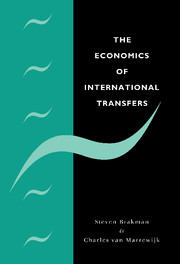Book contents
- Frontmatter
- Contents
- List of figures
- List of tables
- Preface
- 1 General overview and stylized facts
- 2 The Keynes–Ohlin controversy
- 3 Welfare effects: Samuelson's theorem
- 4 Generalizations of Samuelson's theorem
- 5 Clouds on the horizon 1: distortions
- 6 Clouds on the horizon 2: third parties
- 7 The economics of multilateral transfers
- 8 The consequences of tied aid
- 9 Imperfect competition
- 10 Dynamics, money and the balance of payments
- Mathematical appendix
- References
- Index
9 - Imperfect competition
Published online by Cambridge University Press: 07 January 2010
- Frontmatter
- Contents
- List of figures
- List of tables
- Preface
- 1 General overview and stylized facts
- 2 The Keynes–Ohlin controversy
- 3 Welfare effects: Samuelson's theorem
- 4 Generalizations of Samuelson's theorem
- 5 Clouds on the horizon 1: distortions
- 6 Clouds on the horizon 2: third parties
- 7 The economics of multilateral transfers
- 8 The consequences of tied aid
- 9 Imperfect competition
- 10 Dynamics, money and the balance of payments
- Mathematical appendix
- References
- Index
Summary
Introduction
The analysis in previous chapters assumed perfect competition, constant returns to scale and price-taking behavior by the producers and consumers and therefore failed to take into account the developments over the past two decades in trade modeling which emphasize scale economies, imperfect competition and product differentiation. Traditional trade models cannot explain the empirical “stylized facts,” while the models incorporating the above features, developed for example by Krugman (1979), Ethier and Horn (1984) or Markusen (1986), are able to explain these empirical observations.
This chapter analyzes the transfer problem in a model which, in its basic form, has become widely accepted in the trade literature in the last two decades, incorporates the modern developments in international trade theory and by so doing embodies the stylized facts. For ease of exposition, attention is restricted to a two-country model involving just the donor and the recipient of the transfer. Incorporation of more countries, however, is straightforward; see Brakman and Van Marrewijk (1991b). As has become clear, differences in the demand structure of donor and recipient are the driving force behind any transfer effects (with the exception of the direct income effect). We focus our analysis on different spending behavior and different demand elasticities, respectively, for donor and recipient. These issues are most readily understood and analyzed directly, so that we will make only limited use of the dual approach in this chapter.
The model distinguishes between two types of commodities, a basic commodity (called food) produced under constant returns to scale and a large number of manufactures produced under increasing returns to scale in monopolistic competition.
- Type
- Chapter
- Information
- The Economics of International Transfers , pp. 152 - 173Publisher: Cambridge University PressPrint publication year: 1998



